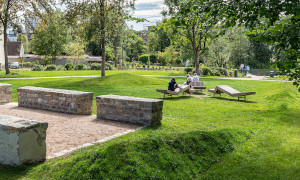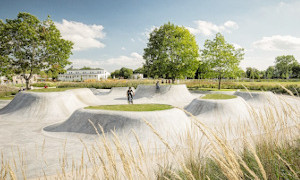On 22 November 2024, the heads of the bdla met for a closed meeting in Ettersburg to discuss artificial intelligence (AI) and digitalization.
The potential and challenges of this technology were discussed in depth with four speakers. In subsequent workshops, concrete action requirements for planning offices, universities and the association were formulated. There is no doubt that landscape architecture is facing a significant change through the use of AI, which will have a lasting impact on working methods in the sector. The bdla will actively tackle this task in a series of initiatives.
In his speech, bdla President Prof. Stephan Lenzen emphasized the possibilities of image-based AI applications and the practical integration of these tools into the day-to-day work of planning offices. He spoke of a "partner at the table" or "designer yoga", with which a portfolio of ideas can be created. Lenzen also pointed out that AI can also be an important tool in the further development of sustainable concepts and raised the question of proactively formulating needs as to which tools are specifically necessary for landscape architects.
{gallery}
Jessica Gabler from the Ostwestfalen-Lippe University of Applied Sciences also presented the BeesUP! project, which uses AI to promote biodiversity. Here, plant characteristics are linked with the specific species requirements of wild bees in order to generate innovative plant communities in a targeted manner. Matthias Funk, head of the bdla BIM working group, emphasized in his presentation "Digitalization and AI in landscape architecture" that a general understanding of neural networks such as chatbots, image recognition or GPT models must be created across the board.
The integration of AI into studies and teaching was the focus of the last individual lecture by Prof. Christian Graf from the University of Applied Sciences Rapperswil in Eastern Switzerland. Graduates who already have AI expertise could provide the offices with far-reaching impetus. At the same time, however, he made it clear that the sound and broad-based specialist knowledge of landscape architects remains essential, but that AI will add new approaches.
Suggestions included a nationwide event, a survey on the type and use of digital tools and the facilitation of synergy effects in the professional exchange between planning offices, for example through chatbots. In conclusion, the participants emphasized that in addition to risks such as data protection and copyright, the opportunities and potential must also be at the forefront. AI can contribute to the optimization of processes, the development of sustainable and multicoded concepts and the promotion of creativity - if it is used in a targeted and well-founded manner.
- Latitude: 0
- Longitude: 0


